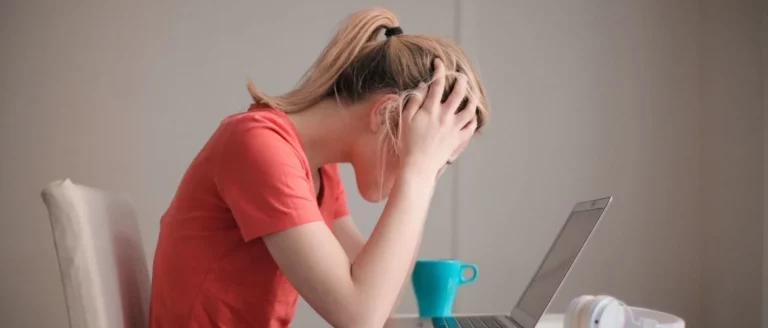Partner with a burnout: At some point, your partner has physically and mentally collapsed. In fact, you already knew that it would happen one day. Also that recovery can take a long time. The question that then comes to mind is: how to proceed? Even more misunderstanding and arguing? Let’s dive deeper and find out more about burnout and how you can ensure that your relationship can survive this difficult time together.
A burnout always comes unexpectedly
More than a million people are at risk of burnout every year. For many, the burnout comes as a thunderclap when the sky is clear. This does not only apply to those who get burnout, but also to their partners.
Regardless of age or gender, I often hear from the people I coach that they were surprised by the fierce signal their bodies gave them: ‘suddenly I couldn’t do anything’, ‘I wanted to get out of bed, but I just sank through my legs’, and so I have many more examples.
Every year, more people experience a burnout in their immediate surroundings. This also happens in my family and friends. I experienced this myself up close when my partner had a burnout. It was very confrontational for him the moment his body stopped him. I saw that thundercloud coming for a while now, but unfortunately: there was nothing I could do about it. My role was to stand by it and look at it. Terrible!
I see a lot of partners struggling with this challenge. Questions like: How do I make sure I give him what he needs. And: How do I make sure that I stay upright myself?
Can we help you?
Leave us your information and one of our coaches will contact you in 24H

Relationship problems due to burnout
Just as people can get burned out, so can a relationship. An overburdened relationship arises because one or two partners are continuously overburdened.
The stress curve shows this: If there are too few demands on your relationship, you feel less connection and love, and you are less motivated: a bore-out is lurking (box 1). If you want more from each other and the demands you make meet whatever you can, you feel more security, safety, connectedness, trust, and have fun in your relationship. (box 2)
There may also be a challenge, a difference of opinion, a move, a financial setback. Beyond that level, or if it takes too long continuously, positive stress turns into negative stress. Then the return becomes negative and that gets worse and worse as the load increases. In the end, the increasing burden can threaten your relationship (box 3).
Recognize overburdening in your relationship due to burnout
If more is asked of you than you can handle, a challenge becomes a chore, and even worse, a burden.
You experience this overburdening in your relationship:
- Doing fewer things together
- Small things become big annoyances
- Less fun together
- You’re communicating on a different wavelength
- Fights
An overburdened relationship often arises when there is a burnout partner.
Also read: Mental and emotional exhaustion: causes and solutions
Impotence and incomprehension partner with burnout
Back to a partner with burnout: Many partners experience a great sense of powerlessness. How did I experience that? Standing on the sidelines, unable to do anything. Just as you can’t influence the weather when you see a thundercloud coming, you can’t do anything about a burnout lurking in your partner’s face. That doesn’t feel right.
But doing nothing is too big a word. Of course you’d like to do something. You’re desperate to help your partners burnout. So I tried to help him, I gave him ideas to relax more, to cancel appointments, to move more. But my help didn’t arrive, you’re too close as a partner. He certainly doesn’t want to hear it from you. I can understand that: just at home he looks for peace and not for good tips and changes. For me personally that didn’t feel right after all.
I can understand that: Right at home he is looking for peace and not for good tips and changes. For me personally that didn’t feel right anyway
In addition to powerlessness, I bumped into this:
- The family went crazy and the burden was on my shoulders
- Housekeeping became my main task
- Regularly I had to hold back
- It even took a lot of effort to stay afloat
- I often felt insecure about how long the burnout would last

Partner with a burnout
But how many times would you like to shout “Come on! Don’t think like that, don’t be like that!” “I don’t know how much longer I can hold out” Don’t you see my fatigue?
You’re afraid it’s never going work out together again, afraid of losing your partner, afraid of not being able to handle it. Then you crawl into your own world and think ‘just figure it out, I’m not there’… Is this going to solve anything? Of course it doesn’t! It feels nice for a moment, but it’s not constructive (but sometimes seductive).
If you do what I did – out of fear of fencing myself off – there’s a chance you’ll overburden yourself. You don’t want that, and neither does your partner. You have to feel that it has to be different, otherwise you’ll both be upset!
Doubts about the relationship and relationship problems
Relationship problems regularly arise with a burnout partner. An example from practice:
A tough road builder as a customer: used to being outdoors and in good physical condition. But still tired, tired, tired. The pressure of work, the hobby (10 sheep) and the family (three daughters of 14, 16 and 18 years old) were all too much for him.
A grumpy, grumbling, quickly irritated man who gives brief answers to questions that are asked. A bunch of girls who think it’s all very unfair, don’t have a good time and also start to react, get angry with each other and reinforce the insanity. And his wife?
He started to do more and more on his own, tried to make sure that there was nothing left for him to complain about and went on and on. She no longer felt appreciated, while the pressure of that grumpy man, the arguing girls, her own work in caring and housekeeping became too much for her. So she, too, became short, always tired, didn’t have any fun anymore and dragged on and on.
Divorce, break up or fix the burnout?
The overtiredness of one partner easily leads to the burnout of the other, due to the stress that occurs within the family. And a divorce seems imminent.
It often takes years before body and mind stop overburdening. In many cases, you as a partner are more likely to get the hang of it. Your partner is no longer herself, has ups and downs, is irritable, tired, lifeless. The attention for you is getting less and less, and so is the desire for sex. You have the feeling that you are growing further and further apart. It is a slow process, small steps to less and less functioning, less and less being oneself. More and more misunderstandings, more and more words.
Then it’s all about it. How much love, energy, patience and understanding are there left? How easily do the partners give up the fight of whoever has the hardest? How much openness is there to really listen to each other? And above all, to hear what is being said. If it doesn’t happen, a marriage can’t be saved and what often began beautifully, in a divorce, ends.

Communicating with your partner with burnout
But you don’t have to. By setting both partners in motion and making them aware of their senses, the relationship can even become better than ever. The problem is often that both partners try too hard. Man buys a bunch of flowers for his wife but forgets to mention that he bought them because he loves her.
His wife asks if he is going with her to walk the dog and she means to say that she would like to be alone with him for a while or talk to him. Thinking that the other person understands your intention and disappointment if it is not picked up the way you like it, lurk.
For your partner it can be very difficult to discuss what is there. This may be because your partner simply doesn’t know it, or your partner doesn’t want to hurt or burden you. You may also have the tendency to stop talking to your partner. But stopping talking doesn’t solve anything. At least express your intention, stay in touch with each other.
The consequences of a partner with burnout
As a partner of a burnouter, it’s quite a challenge for you to keep your life fun. You have the housekeep to run, you work, you worry about your partner and perhaps also about your relationship. So when the moment comes that your partner starts to feel better again, does more and can give you more attention, you feel relieved. Finally you can catch your breath and enjoy the attention and care your partner can give you again.
I found the first recovery very nice to follow. I saw that my partner came back more and more every week. More energy, more rest, more attention for me. The mental recovery went a lot slower. For him it was quite a job to see patterns, to accept them, and finally to do something about them. Because if he continued the way he did, he would get what he always got.
That wasn’t what he wanted. Those conversations with himself, but also with me, talking for hours about how different while he felt stuck in his thoughts and habits, and that’s tough. It seems like a repetition of moves, talking about the same thing over and over again and feeling that he’s not getting any further with it. But it takes time, I know that, it’s a process of small steps. Patience! I myself always say ‘life takes time
Burnout and yet happy together
When you realize that you don’t have to survive at all, but that you are facing a (considerable) challenge, then a lot of things will happen in your mind and body.
- You focus on what you want (going for it together, coming out stronger, and that makes you feel good).
- The attention is more divided and you are more willing to make contact (support each other and take care of each other).
- Your body reacts more like it would during exercise (it’s safe, so maximum circulation to give energy, blood vessels stay relaxed, and that’s a lot healthier for your body).
Also try to see the positive effects in the moments when you are struggling during his recovery and experience that you can become stronger from your experiences:
- How does it give you personal power? Do you think differently about yourself and what you can handle?
- Can you enjoy more simple moments? Have you started spending more time on the things that give you pleasure?
- Did you get better contacts with your friends / family?
- Do you see new possibilities and directions in your lives?
It’s not just that you have a burnout partner. Together you experience the consequences of having a partner with burnout. Despite the diminished energy of the partner with burnout, you still have a relationship together.
How your relationship survives a burnout
In the video below, Kiki Voncken (partner coach) shows you what you can do for a partner with burnout.
As I said, a burnout causes a head to get over and crowded. The head has to be empty, but thinking about emptying your head makes it even fuller.
You clear your head by learning to use your senses again. Hear what the other person says, feel what’s going on, see that a tear is shining in one eye. Reacting to that in a warm, loving way. A path where both partners look at themselves and learn to trust their own feelings again. And at the same time a path on which the partners walk side by side again.
Agree to make time for each other and go out together, walking, running, cycling or sports and make time so that body and mind get some rest.

Burnout tips partner
We’ll give you a few tips below.
1 | Don’t forget yourself
Think very carefully: if you’re in a burnout together you’ll come out of it completely but it will be difficult. So sometimes it’s important that you dare to say that you’re not in charge of the problems for a while and that you’re looking for help from the people around you. They can help you to take chores off your hands. For example, taking care of the children for a day, mowing the lawn, shopping etc. Things that don’t make you feel like you are falling short.
Make sure you have an exhaust valve. A good friend who understands you, for example, or the coach/psychologist from whom your partner gets help. What makes you really happy? Do that at least once a week. A partner with burnout also costs you energy and by doing things that give you energy, you make sure your own battery is well filled.
2 | Remaining active
If your partner has a burnout, it’s tempting to sit behind the geraniums together. You want to help your partner and hear his story, but the other has no energy and prefers not to make the effort. Make sure you move around together, no matter how difficult it is. Exercise will help you recover from burnout. Undoubtedly, your partner will initially struggle, but in the end gratitude will triumph. Moving also helps against stress, as you can read here:
Although running is a healthy option, it is often not possible. Another healthy way of moving is to walk a long staircase during your walk. You could also put on a backpack with some weight in it. This way you still have a nice intensity, without crossing borders. Make sure you are in motion. Charge your battery by taking a walk in nature for half an hour every day. And if it feels good for you, ask your partner to join you. Exercise will help you recover.
If you feel stuck in your relationship, literally get moving. The fresh outside air clears your head. In addition, your body creates endorphins that make you feel good.
3 | Do not judge
Don’t go judging your partner on the causes of the burnout. Don’t say: ‘you’ve also worked way too much’ or ‘you’ve always worked with your idiotic methods’ or ‘resist a little, it’s an important day today’. Apart from the fact that a partner with a burnout can be a rather difficult, moody person, it is in both your interests to keep the peace. Frustration will make recovery slower.
Unfortunately it is not visible on the outside that someone has a burnout and often someone with a burnout can’t even describe his own feelings. So don’t judge, but keep an eye on the progress in recovery.

4: Listening to your burnout partner
No matter how much you like to come up with great advice: Listen to your partner with a burnout. Especially in the early stages of a burnout that someone has just become ill, the body, and therefore the mind, is so unbalanced that there is no question of learning, or absorbing it. This just doesn’t work.
Try to listen carefully, it creates peace and you create space for deeper conversations so you can better help your partner.
5 | Increase your knowledge
Knowledge is power and everything starts with insight. Read what a burnout is exactly. We have a large number of blogs and articles about this. If you understand what a burnout is, take a closer look at how your partner should feel: empty, tired, depressed, pointless, frustrated, loveless.
If you understand what your partner’s going through, you’re doing really well. Read about burnout, try to understand what it means to have it. Extreme fatigue, chaos in your head, not understanding and wanting it yourself, that must be quite a challenge for your partner. It helps to have more understanding and to experience the recovery period with more patience and strength.
6 | The feeling of powerlessness may be there
Fighting the feeling of powerlessness only leads to frustration. Accepting that it’s there takes less energy than the endless battle.
7 | Talk about it
Talk to a good friend about what you’re going through, what you’re feeling. Also remember that you can talk to the coach your partner is getting help from. Expressing your feelings to someone else helps you keep in touch with yourself. This makes it easier for you to indicate your limits and make choices. It helps you to recover from tensions you have and to calm yourself.
Even if your partner is forced into social isolation, that does not mean that you have to be dragged into it. So sometimes you can really choose for yourself! In fact: if you want to continue to support your partner and do not want to fall over yourself, you will have to.
Helping partner with burnout
Personally, I think that the partner, or family, of the person with a burnout is too often neglected. That is why I regularly offer help to family members. This is not very exciting and profound, but it does increase the effect of a coach’s help to a burnout patient.

Training and coaching
Milltain provides training and coaching for private individuals and organisations. Our team consists of 35 coaches and trainers who have now helped thousands of people struggling with stress and burnouts.
Milltain for private individuals:
Are you stuck in life because of stress or a burnout? We developed an effective online programme that is fully focused on the complete recovery from a burnout. More than 2000 people have successfully completed this training!
Movement and nature play prominent roles in this training. Recovery is a process that contains peaks and troughs, and that’s something we know all about. Our highly experienced coaches provide you with active support.
Learn more: Stress and burnout coaching
Stress & burnout coaching; for 100% recovery!
Reducing stress and recovering from burnout is simply incredibly difficult. The coaches at Meulenberg Training & Coaching understand exactly what you are going through and know how tough it can be. They have often experienced it themselves! With their years of experience and expertise, they are ready to help you step by step toward a full recovery. The results of our one-on-one coaching and absenteeism training will benefit you for a lifetime!






